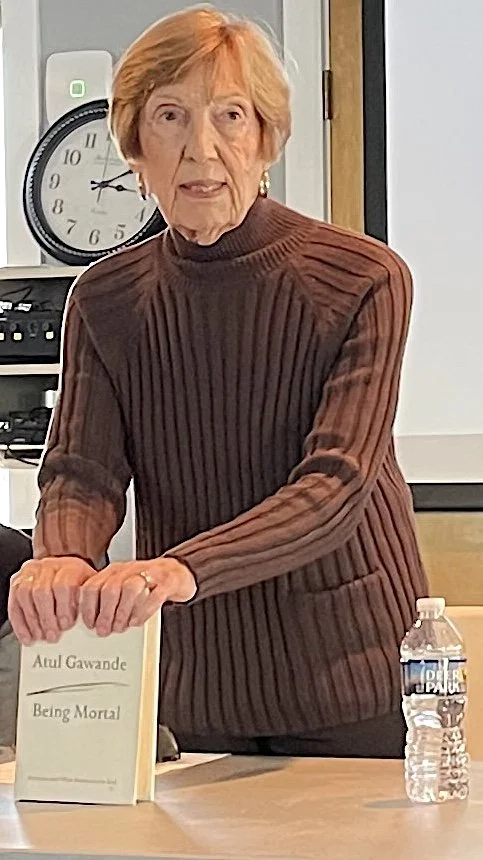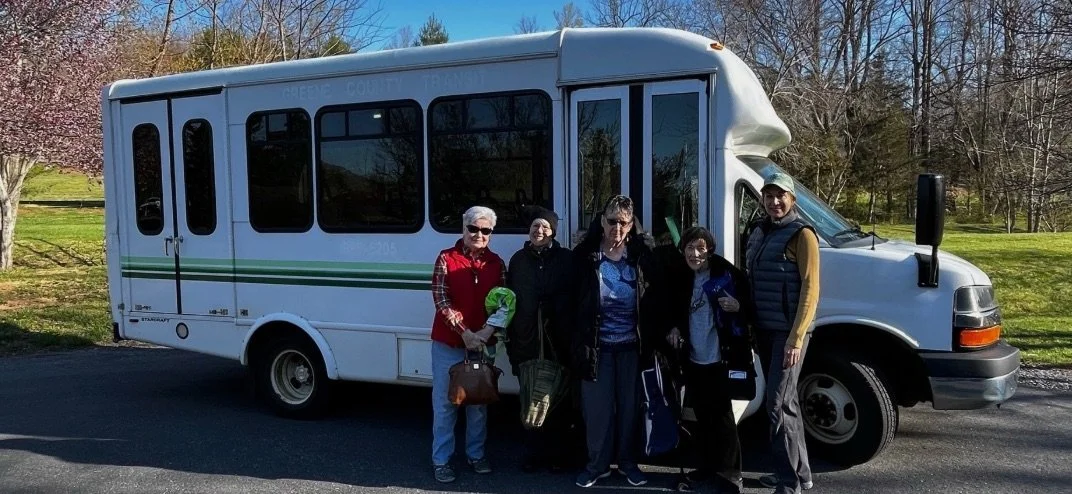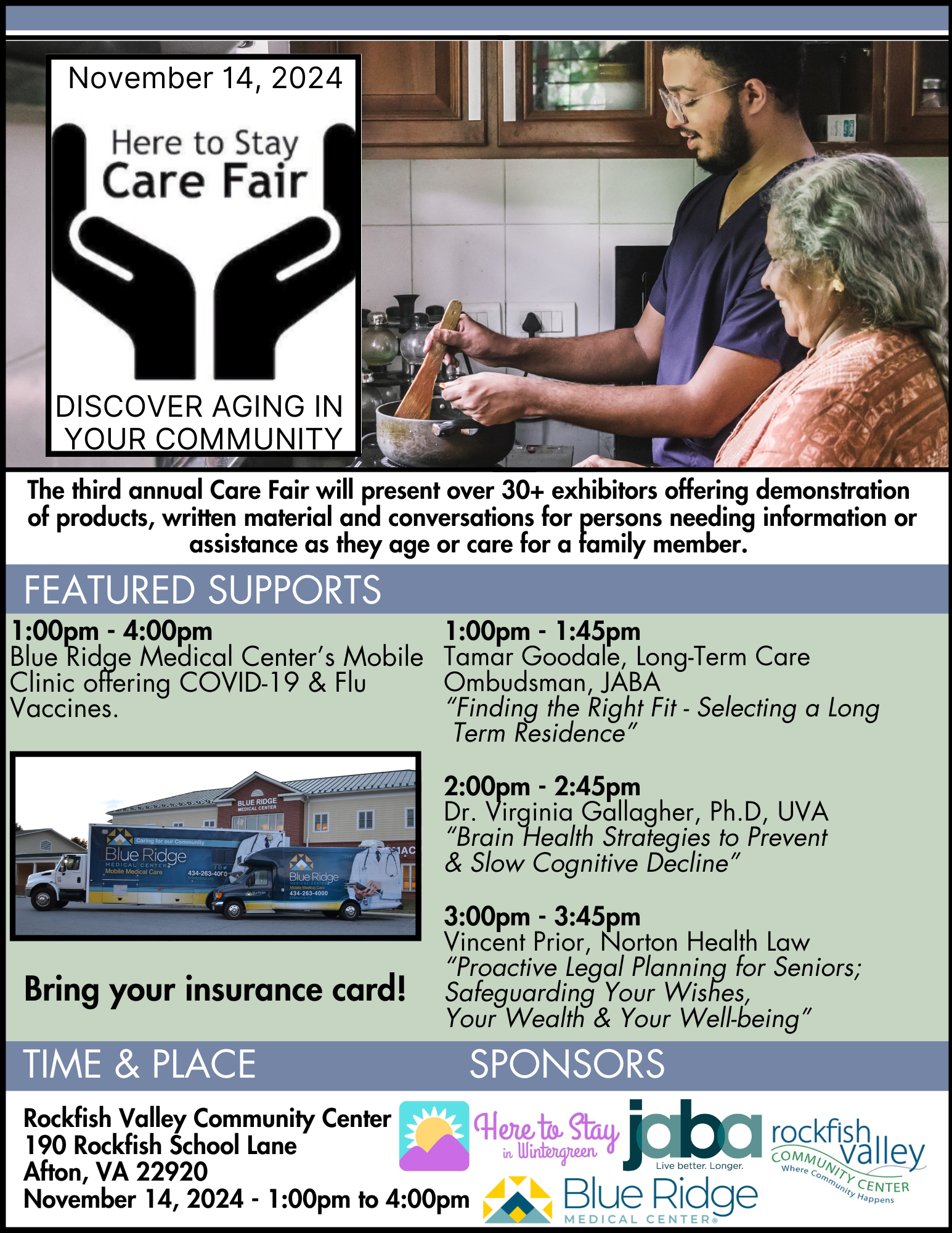Now five years old, Here to Stay in Wintergreen has seen tremendous success. The next five years will bring new challenges.
It was about 90 minutes into the business meeting minutiae when one of the key volunteers at Here to Stay in Wintergreen spoke out from the audience. “Most people are not aware of what villages are,” said Barbara Gibb.
No one in the room of 29 leaders, involved members, and active volunteers disagreed. While it wasn’t the point the leaders were trying to make, it was clear from the speakers' wide range of topics at their January 16th “forum” in Tuckahoe Clubhouse’s big meeting room, Here to Stay in Wintergreen is sometimes difficult to explain.
Sign up here for HSW’s free email newsletters. They are free to all although members and volunteers will see more from HSW in their inboxes.
"We are neighbors helping neighbors who want to continue living safely and independently in their Wintergreen homes," says HSW’s website. The challenge comes in how that happens. (See one national “village” organization’s description here that is applies to what is being done at Wintergreen.)
There were two handouts at HSW’s Thursday afternoon session at Tuckahoe Clubhouse. One was a 2024 financial report; the other was two pages of bullet points with some history, milestones, and a list titled “Path Ahead.”
Linda Harrington will be stepping down as president of Here to Stay in Wintergreen in March but will continue to lead the HSW committee that connects members to resources. Last year she was the leader in developing the new HSW online resource directory focused on services for local seniors.
Linda Harrington, HSW’s president, opened the meeting by pointing to the book Being Mortal by Arul Gawande, just as Kaye Pietrowicz did at the 2019 standing-room-only meeting about “aging in place” that launched the organization.
"Being Mortal shows how the ultimate goal is not a good death but a good life―all the way to the very end," the book’s publisher says.
The leadership and volunteers of Here to Stay have tasked themselves with the job of finding or creating a variety of discernible care options that can help its members have a good life at Wintergreen–“all the way to the very end.”
The how-to-age-in-place organization has grown from 73 members in 2021 to 225 in 2024. Volunteer numbers doubled, going from 31 to 60. Harrington and others on the panel at the meeting said that as more people learn about what HSW is doing, they expect to see more Wintergreen residents join. (Membership is restricted to those living at Wintergreen.)
One goal for 2025 is to establish a strategic planning committee to develop a business plan to look at growth, additional services, and financial needs, according to the handout.
Help with Home Technology is Key
If they work, personal computers, smartphones, smartwatches, computer printers, and specialized high-tech gear can make aging in place more practical.
So, while transportation requests have been the number one volunteer-driven service used by HSW members, requests for assistance with technology in the home have been a close second.
The tech help program was created and managed by Tim Ketchmark, HSW’s vice president.
“I don’t have a tech background, but I’ve learned how to Google problems. That often works,” Ketchmark said at the January 16th meeting. His team has several who could be called techies, including new HSW board member Peggy Watts Gup.
“The tech volunteers make house calls,” Ketchmark stressed. They have gone into members’ homes to set up new printers, worked with smart TVs, and troubleshoot smartphone apps.
The consulting service is free to members. “If they ask, we’ll remove our shoes before coming inside,” he said. The tech help committee volunteers have Apple and Android experience.
The tech help committee also holds monthly meetings open to members and volunteers. They have proved popular.
Usually, a meeting opens with a short presentation on a topic such as “the cloud” or how to put “in case of emergency” information into a cell phone. Afterward, there are one-on-one sessions where volunteer techies help those who show up with their troubled smartphones, tablets, smartwatches, or laptops.
While stepping down from the HSW board, Ketchmark said he would continue working with the tech help program.
While members’ needs are being met now, Harrington said there will soon be a need for more volunteers, especially drivers.
She noted that volunteering with HSW doesn’t have to mean committing to it long-term. “We would work with someone who simply wanted to organize a one-time program, say a trip to go see a popular movie or a trip to see a specific show at the Wayne Theatre.”
One specific sign of how HSW operations are becoming more complex was the report from HSW’s treasurer. Jeff Goebel announced that HSW was moving its accounting onto Quickbooks, and he was stepping down from serving as treasurer because he was a retired statistician, not a CPA.
Goebel’s 2024 HSW financial report had a breakout for an ambitious new HSW program called the Nelson Enrichment Club. Its goal is to "provide a caring and safe environment for individuals experiencing memory loss" while at the same time "providing a restorative break" for caregivers. The financial report showed $84,742 in revenue for NEC, most coming from grants.
NEC now meets twice per week, on Mondays and Wednesdays from 10 am to 2 pm, at the Rockfish Presbyterian Church.
HSW Board Member Gordon Walker reported that NEC now has 11 clients and there is room for four more. The program is not free; clients pay $40 a session (“scholarships” are available). NEC is open to everyone in the community.
Looking at the bigger picture, Walker told those assembled, “We need to get our members to think ahead and help us figure out how we can be more helpful to them.”
Other topics touched on at this meeting included:
Transportation is the most popular of the volunteer services offered to members of Here to Stay in Wintergreen.
A member can make an appointment for a one-on-one ride to and from any location in the area. Volunteer drivers, using their own cars, provide door-to-door service.
A small part of its transportation for members’ effort is a 14-seat bus donated to Here to Stay by JAUNT last year.
Tim Ketchmark, who coordinates the all-volunteer bus program, reported at the January meeting that the used bus with a wheelchair lift only took about $1,200 of work to have it made serviceable.
The bus has been making regular grocery runs for members on the first and third Thursday of every month with one of the five trained volunteer drivers behind the wheel.
“There are only eight slots for shoppers on the bus due to the space needed for groceries,” Ketchmark said. “About five people are on most grocery runs, so we have room for more shoppers.”
Other ways to use the bus to serve members are being sought. “Tell everyone to send us ideas,” he asked.
The Care Fairs held in November is an example of how Here to Stay in Wintergreen working with other organizations.
Last year, HSW hired a part-time administrator to work 10 hours a week. Harrington said that a full-time executive director could be needed soon, and an increase in annual member dues had been discussed by some on the board of directors.
HSW continues to add to its team of volunteers who make up a “senior help desk” that links members who need assistance with specialists. Members looking for assistance can email HelpDesk@HereToStayWTG.org.
The demand for the Life Plan program, which started last year, has grown to where to cover costs, HSW now charges $25 for the program’s workbook.
The Caregivers Support program “continues to have great chemistry,” reported Gordon Walker, one of this program's leaders. It is free and open to everyone in the community, meeting on the second Wednesday of each month.
Social programs are a vital part of what the organization is doing to help those in Wintergreen age in place. HSW’s calendar now lists several regular small gatherings as well as larger meetings. Potluck dinners were added this year and should become a regular event.
There are 18 “villages” in Virginia similar to Here to Stay in Wintergreen. A loose coalition has been formed that is now lobbying the state for financial resources.
HSW board member Dr. Tinsley Rucker was the leader in making a case for the UVA Pharmacy in Nellyford, which is seeing plenty of business. HSW is now discussing with UVA the need for physical therapy services in the area, pointing to the 3,000 square feet of unused space UVA is leasing for the pharmacy in the shopping center.
HSW wants to serve its membership by collaborating with others in the area. “We want to avoid getting into things that would be better done by others,” Harrington said. A potential collaboration could be in a new initiative called Partnership for Accessible Transportation Help (PATH). The goal of PATH is to bring more volunteer drivers to serve not only HSW members but also non-drivers throughout Nelson County. PATH might reduce costs for HSW as well.
-Charles Batchelor






